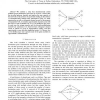Free Online Productivity Tools
i2Speak
i2Symbol
i2OCR
iTex2Img
iWeb2Print
iWeb2Shot
i2Type
iPdf2Split
iPdf2Merge
i2Bopomofo
i2Arabic
i2Style
i2Image
i2PDF
iLatex2Rtf
Sci2ools
100
click to vote
GLOBECOM
2008
IEEE
2008
IEEE
The Gateway Channel: Outage Analysis
— We consider a relay that simultaneously assists multiple source-destination pairs that do not have a direct link, the so-called gateway channel, and explore the sum capacity of this network in the presence of quasi-static fading. In the absence of transmitter-side channel state information (CSI), we study superpostion as well as orthogonal channel access. In the presence of transmitter CSI, we consider opportunistic channel access with full CSI, as well as limited CSI via a 1-bit feedback (per user). In each case, the outage capacity and the diversity-multiplexing tradeoff are calculated. It is observed that orthogonal channel access is almost as good as superposition coding, and that opportunistic access provides signficiant gains. It is shown that a 1-bit feedback per user captures most of the gains available in opportunistic communication.
Channel Access | GLOBECOM 2008 | Opportunistic Channel Access | Orthogonal Channel Access | Telecommunications |
Related Content
| Added | 29 May 2010 |
| Updated | 29 May 2010 |
| Type | Conference |
| Year | 2008 |
| Where | GLOBECOM |
| Authors | Mohamed Abouelseoud, Aria Nosratinia |
Comments (0)

